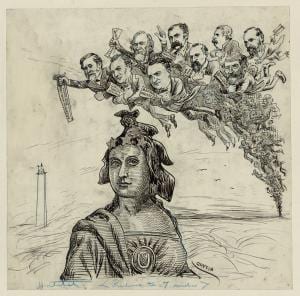
Government should work for the common good. Politics should be about establishing the best policies which help establish the common good. Those in positions of authority should realize their call is one of service for the people. When they hold power, it should not be for their own sake, but for the sake of others. Thus, if a politicians interferes with the political process so as to gain power for themselves and ignore the common good, they should be removed from office and replaced with someone who will serve the people instead of themselves. When politicians try to use their authority to give themselves more power, such as using laws for their own benefit at the expense of the common good, they must be stopped. Otherwise, as Pope Francis understands, the future of society is put at risk, and the youth of society, who know that the future in question is their own find themselves in a hopeless situation:
When the exercise of political power aims only at protecting the interests of a few privileged individuals, the future is compromised and young people can be tempted to lose confidence, since they are relegated to the margins of society without the possibility of helping to build the future. [1]
Politicians should not be interested in preserving power for themselves, nor should they be interested in only appealing to and honoring the desires of the elite. Self-serving politicians use government against its own proper end. When they are not stopped, the common person, and those living in the margins of society, find government is no longer looking after them and their needs. This is how tyranny develops.
In democratic societies, it is important to make sure no one is disenfranchised, no one is unjustly prevented from participating in elections. Everyone must be honored and respected; everyone must have a voice and be heard. This is especially true with those in the margins of society, such as those who have historically suffered from various unjust biases by society. True freedom is had only when those who have been abused by society are lifted up with proper reparations for what they have suffered. As the Congregation for the Doctrine of Faith indicated in 2002, democracy requires the active participation of all in society:
It is commendable that in today’s democratic societies, in a climate of true freedom, everyone is made a participant in directing the body politic. Such societies call for new and fuller forms of participation in public life by Christian and non-Christian citizens alike. Indeed, all can contribute, by voting in elections for lawmakers and government officials, and in other ways as well, to the development of political solutions and legislative choices which, in their opinion, will benefit the common good. The life of a democracy could not be productive without the active, responsible and generous involvement of everyone, «albeit in a diversity and complementarity of forms, levels, tasks, and responsibilities».[2]
True freedom is found with the promotion of the common good, and in democratic societies, this means making every effort to help those who have previously been marginalized have an active role in government and the democratic process. Any attempt to disenfranchise them through the perversion of the democratic process, such as by establishing laws which make it more difficult for them to participate in elections, requires a sharp and decisive rebuke by society unless society as a whole wants to find itself burdened by oppressors who will have no problem marginalizing more people in the future in order to stay in power. Thus, when many states have politicians are trying to make it tougher for the people to vote, with laws and regulations which especially harm the most vulnerable of society, we must denounce them even as we fight against their attempts to put such laws in place. It is amazing how many who talk about freedom mean only their own freedom. They act as if freedom is a zero-sum game so that if they are to be free, others must be made unfree through oppression. This is why we find various words being subverted by them, so that they are used to indicate the opposite of what they were intended, as Pope Francis decried: “Nowadays, what do certain words like democracy, freedom, justice or unity really mean? They have been bent and shaped to serve as tools for domination, as meaningless tags that can be used to justify any action.”[3]
How can anyone justify laws which make it illegal to give food and drink to those who are standing in line waiting to vote, when someone can stand in such a line, due to the way states have limited the number of polling places, for ten or more hours? During a pandemic, how can anyone say mail in voting is not necessary, especially, since many of those states trying to argue this have also reduced the number of polling places, putting those who want to vote at greatest risk as the lines at their polling places will be extremely long? How, likewise, can someone say they are supporting the democratic process if they make voter registration much more difficult? It should be clear, what those Republicans who are promoting various voting-rights restrictions want is power; they are upset that they did not win various federal and state elections and they feel that the only way they can stay in power is they can find a way to stop the vote and only allow those who are likely to vote for them to have the power to vote. Democracy, freedom, justice, and unity – they believe – is all about them, and for them, and not anyone else. If they get their desire, the common good will be compromised, as they will use their power for their own interests instead of considering the true needs of the people.
What will be the future of the United States? We must not wait and do nothing. We must act now. We must stand and fight for the common good, because it is under threat. We must make it clear to our politicians we will not compromise. We will work for the good of all, not the few. We will lift people up who have otherwise been pushed down. We will stand for the good of all, because only by coming together can there be any meaningful future for us as a society.
[1] Pope Francis, “Message For The Celebration Of The 5nd World Day of Peace” (1-1-2019). Vatican translation. ¶5..
[2] Congregation for the Doctrine of Faith, “Doctrinal Note On Some Questions Regarding The Participation of Catholics In Political Life” (11-21-2002). Vatican translation. ¶1.
[3] Pope Francis, Fratelli tutti. Vatican translation. ¶ 14.
Stay in touch! Like A Little Bit of Nothing on Facebook.
If you liked what you read, please consider sharing it with your friends and family!












